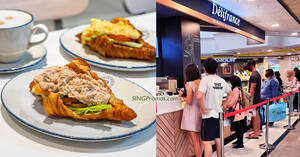
 We are now on Telegram. Click to join We are now on Telegram. Click to join |
1-for-1 dinner buffet @ The Clifford Pier (The Fullerton Bay Hotel Singapore)
Occupying the space of the original Clifford Pier, The Clifford Pier preserves the pier’s hawker culture while honouring its historical role as the landing point of Singapore’s forefathers. The menu showcases the rich diversity of Singapore’s culinary culture, featuring Malay and Peranakan dishes alongside Chinese favourites and Western staples.
1-for-1 dinner buffet with DBS/POSB cards! Valid for dinner buffet on Tuesdays and Wednesdays only.
Promotion Period:
- 03/03/2020 to 27/05/2020
Main Outlet:
- The Fullerton Bay Hotel Singapore, 80 Collyer Quay, Singapore 049326
Dinner
- Monday to Friday, 6.30 p.m. to 10.00 p.m.
To make a reservation, please visit here.


Terms and Condition:
- Valid for dinner buffet on Tuesdays and Wednesdays only.
- Limited to the first 100 adults per meal time.
- Prior reservations are required and must be made online through The Fullerton Bay Hotel Singapore’s website. Please select ‘DBS 1-for-1 Heritage Buffet’ under the Promotion dropdown menu and tick the relevant offer box while placing your reservation.
- Valid for a maximum of 8 persons per card per reservation.
- Reservations made through third-party platforms are not eligible for the offer.
- Table seating is subject to the restaurant’s availability.
- DBS General Promotion Terms & Conditions apply, visit www.dbs.com.sg/dbscardstnc.
For more info on the restaurant, click here.
Make your reservations online here. Please select a date that falls on Tuesday/Wednesday (3 Mar – 27 May) and select ‘DBS 1-for-1 Heritage Dinner Buffet’ under the Promotion dropdown menu and tick the relevant offer box while placing your reservation.








“Took a last minute flight back to Singapore to call of duty as a Risk Assessor and Safety & Healh Auditor to help fight Coronavirus/COVID-19 too. Had many Risk Assessment discussions, one with leaders/participants from Hospitality, Tourism, Events, F&B, education institutions and other industries. One of the areas we assessed is why there are many reported infections in Leisure Cruises and hotel business networking event but when many infected persons fly on airplanes on evacuation flights, no airline staff or people on the same airplane get infected. One of the preliminary findings is that Luxury Cruises and Hotel networking events have one thing in common: buffet. In a normal buffet when people socialise and talk while taking food, invisible and visible droplets of saliva can travel onto food and when an uninfected person consumes it, the virus can be transmitted easily (buffet food can be left out there for up to 4 hours and you never know how many people had talked over the food prior). Thus, possible control measures include discouraging people from talking over buffet/displayed food or have some form of barriers for droplets/saliva over the food and dedicated healthy masked servers to dish out food instead of common-use serving cutlery. The same goes for communal food events in chalets or after an event. On the contrary, on the plane everyone eats out of their own trays not facing someone else, with less talking and eating at the same time. That could be the reason why there are no reported infection on plane despite long hours of being with infected persons in a confined environment. Thus, without transmission through saliva/droplets to someone else’s mouth/nose/eye, it’s difficult to be infected by just being on the same flight or being in the same building with an infected person. At the moment, the probability of aerosol transmission is probably low. Currently temperature taking is a good measure but there are loopholes such as infection before symptoms like fever. Based on Risk Management, we should focus on activities that have higher probability of transmission (talking over food), not just being on location, as it’s difficult to detect. Hopefully by focusing on the right control measures and some change of our lifestyles/habits in such times, it can help in saving lives. The findings are not conclusive as Risk Assessment is still in progress depending on new data or discovery. I suggest we look at our routine/non routine activities and conduct our own Risk Assessment too based on probability and severity and come up with own control measures. Thanks to many who are fighting this battle too. Pray for Singapore, Australia, China, Malaysia and many countries affected by COVID-19.”
– sharing from one of my risk auditor friend .avoid buffet!!
Go for A-la-Carte-better